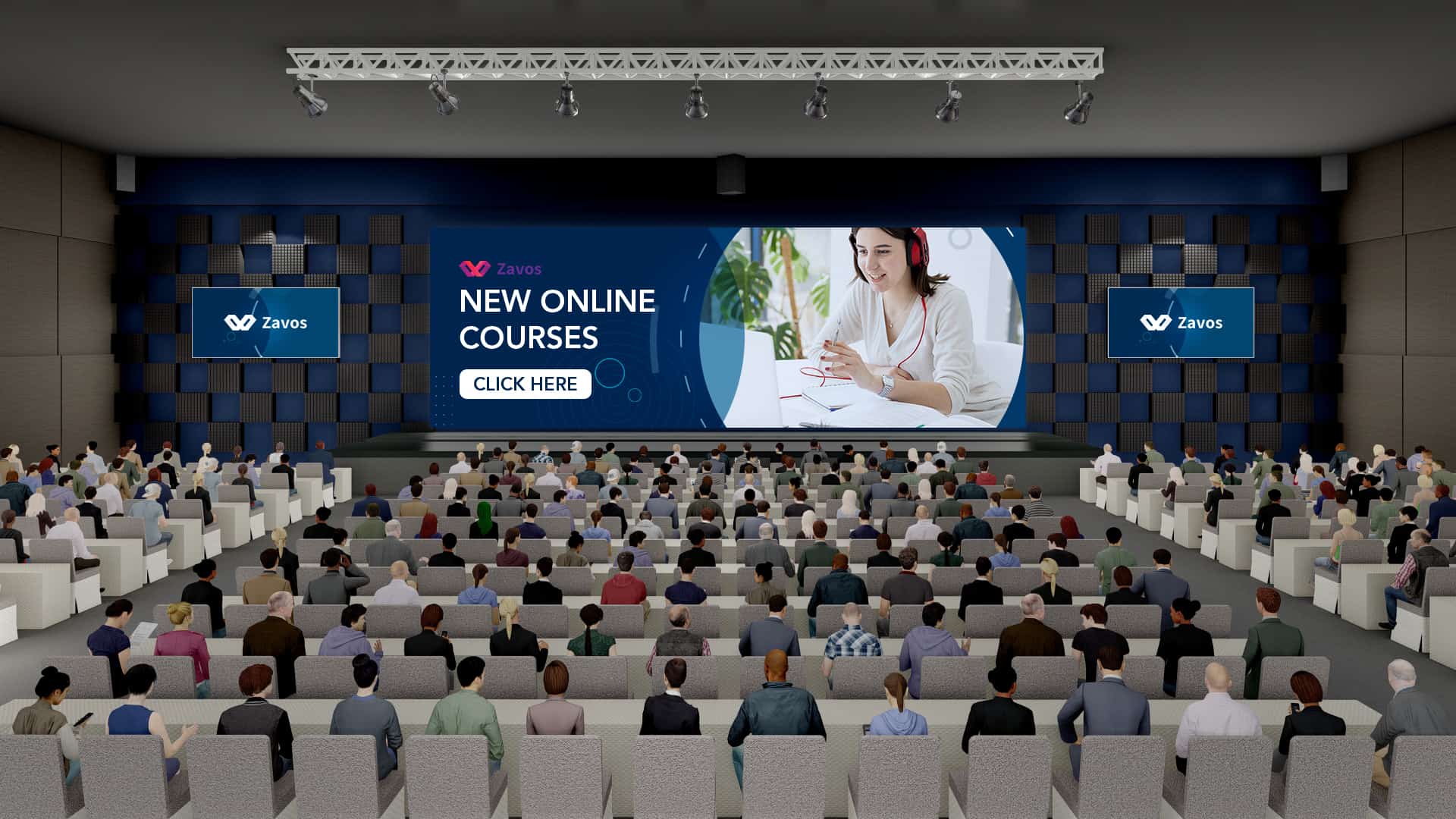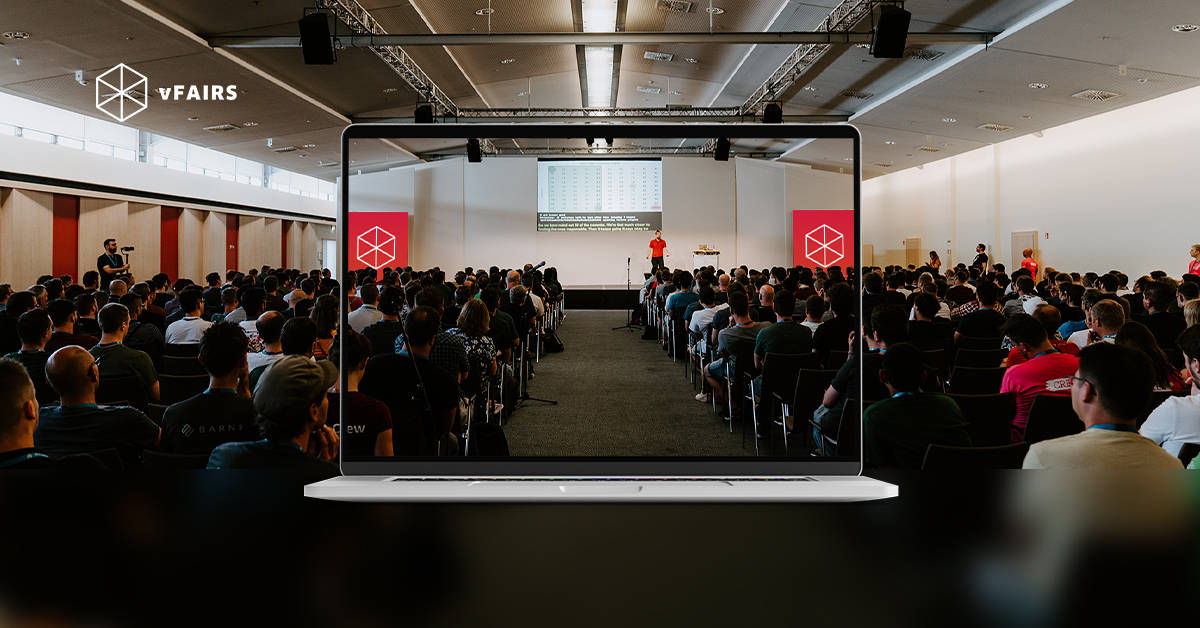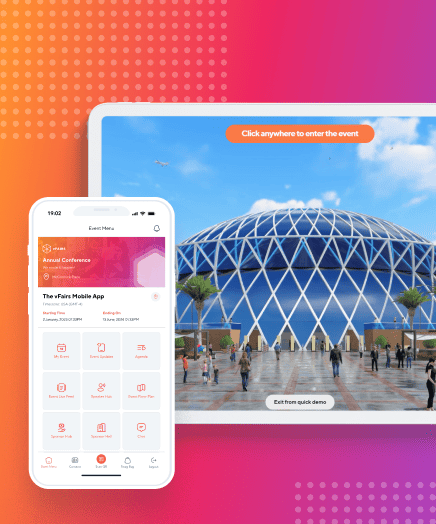It has not been long since virtual events became equivalent to events in general. The infamous pandemic and modern technology became the two main catalysts for the dramatic growth of virtual events. Moreover, exceptional services, such as immersive virtual exhibit halls, interactive 3D avatars, and more, make space for virtual events even in 2023.
However, with the resurgence of in-person events in 2022 and the continued expansion of hybrid events, the event industry offers a broader range of event experiences.
This article will discuss lead generation, engagement, networking, and all possible opportunities with virtual events and their physical counterpart.
Benefits and Limitations: Virtual and In-person Events
Event solutions come with their pros and cons. Before replacing the virtual event solution with in-person events or vice versa, look at their pros and cons.
1. Cost Effectiveness

The part that elevates the attendee experience in onsite events compared to virtual ones is physical networking—however, this priceless experience results in hefty billables for event hosts. From the venue to logistics, every aspect costs organizers more than it would in the case of virtual events. Not only do the event organizers have to set up an additional budget for in-person events, but the attendees also have to bear the travel expense.
On the other hand, virtual venues save the organizers and attendees from renting and travel expenses, respectively. Especially with 3D virtual event service from vFairs, attendees enjoy an immersive and live event experience from the comfort of their homes. High-quality speakers also agree to become part of the virtual event for convenience.
We have to agree that virtual events take the lead regarding cost-effectiveness.
2. Networking

Like several event types, an attendee’s reason for attending an event varies. For instance, in a career fair, students can grab insights into the industry and jobs of their interest. Still, an attendee might only focus on capturing a work opportunity in a recruiting event. However, one benefit that remains universal for all event types is networking. Networking has grown into many modes; face-to-face, interface-to-interface, and more.
In today’s world, we spend most of our time on devices where interactions are formal and almost robotic. In such times, having the opportunity to chat with another person face-to-face is most remarkable.
- Meeting people in person cultivates genuine networking and provides participants with a profound event experience, especially after enabling virtual networking closely into our lives during a pandemic. It is refreshing to attend more in-person events with genuine networking opportunities.
- Luckily partnering with event management software providers like vFairs can help you resolve on-site event needs. vFairs offers dynamic event tech, including a ticketing and registration platform, badge printing, check-in and badge scanning, mobile event apps, on-site tech support, and many more end-to-end services.
- For many reasons, in-person events are a better way to network than virtual events. Yet, communicating with people traditionally can be discomforting for some people. Handshakes, eye contact, and uninterrupted banters can be challenging if they prefer virtual networking.
- Attendees in a virtual event can chat with people they want to. Especially with networking features like matchmaking, the event-organizing platform chooses the right match for you. It is fun to chat with people with similar interests or backgrounds.
Bottom line- Networking in-person is a fun experience that sometimes can be time-consuming. You can avoid handshakes with virtual networking, but you might miss a chance to make genuine connections.

3. Personalized Merchandise
Grabbing freebies is still one of my favorite post-event things. Especially in an in-person event, personalized merchandise is super engaging and fun.
Virtual events organizers have yet to spare this element as well. Virtual swags are popular among virtual events and attendees. Some hosts ship their personalized merchandise to speakers who can record their sessions while wearing them. Brands like Apple, Door Dash, and even Starbucks offer virtual gift cards as part of the virtual swag events.
Although gifts in all forms and types are a bonus in an event, in-person events set the bar high with merchandise.
4. Reporting and Analytics
After a physical event comes to an end, it becomes a hassle to gather data, analyze it to improve the experience and see if the event was an overall success. The data to measure success can revolve around the number of attendees, the number of times attendees visited a booth, and/or attended a webinar. While these statistics can be taken from physical events, it can be an ordeal as it takes a long time to correctly record this physical information.
Switching to a virtual event can lead to this data being more accurate and helpful as it would be readily available. What worked and what needs to be eliminated can be decided based on this data. It can be used to plan and organize groundbreaking events in the future. Not just this, but you can produce insights based on the sort of content that was consumed most, in order to further study your customer profiles and their entire buyer’s journey.
5. ROI-Effects
Long-term ROI effects take time to measure. However, a host can reach and cater to a large audience with virtual events. Not only this, but virtual events help attendees access networking and on-demand content.
Nevertheless, with in-person events, it is easier to understand audience needs to have a strong brand association. In-person events help marketers create the right marketing strategy to put in place. This also includes coming up with lead-generation techniques and methods.
It is easier for speakers at an in-person event to connect with the audience. Speakers can easily convey their message to the audience with proper presentation customization. This eventually helps with brand messaging and event ROI.
Moreover, taking full advantage of on-site event tech can help with long-term ROI effects in an in-person event. For example, vFairs offers white-labeled mobile application services which enhance audience experience in an in-person event. The mobile application helps with easy check-in, capturing participants’ contact information through QR codes, watching session replays, finding exhibitors, and much more. All these features keep the audience excited throughout the event and help them connect better with the brands presented during the event.
A guide to in-person event hosting is a fool-proof method of increasing lead generation.
6. Scalability
Physical events most often are restricted to the number of attendees due to the capacity of their venues. Needless to say, as you increase the capacity, you also end up utilizing an expanded budget.
In case of virtual events, you can increase the audience tenfold and still not spend as much as you would have had to at a physical event. These events therefore cater to expanding your reach and eventually benefiting you in terms of improving your brand awareness.
7. Evergreen Content
You’ve spent endless number of resources and exhausting hours to generate content for your event. Whether it is the content present at the booths, made for branding purposes, or for marketing – at the end you’re going to watch it being taken away with the trash.
Good news is, at a virtual event, all your content is under your ownership and can be used for future communications. In short, all your hard work is not just restricted to the duration of your event, but can be categorized as a life long asset.
8. Personalized Feedback
In-person events offer organizers a unique advantage in the form of immediate, firsthand feedback. When you’re physically present at a conference or gathering, you have the ability to directly observe the ambiance within the conference hall. This means you can gauge factors like the comfort of seating, audio-visual quality, and the overall flow of the event. If any aspects of the event require improvement, you’re in a position to address them promptly.
For example, if attendees seem uncomfortable due to seating arrangements or the room temperature, you can take swift action to rectify these issues, ensuring that attendees have a more enjoyable and productive experience. This real-time feedback loop allows you to make on-the-spot adjustments, enhancing the event’s overall quality and leaving a positive impression on attendees.

9. Environment-friendly
Hosting an environment-friendly event not only helps contribute to a better world but also helps with increased reach and lower cost. These benefits eventually lead to higher ROI, which makes hosting green events a win-win situation.
However, virtual events help reduce carbon footprints more quickly in this case. With virtual events, hosts and attendees do not contribute to emissions produced from traveling, food waste, and one-time-used event products.
Nevertheless, for all the reasons listed above, if you are willing to host an in-person event, you can still make it environment-friendly.
With vFairs sustainability initiative, Go Green & Global; you can reduce carbon footprints by going paperless in an in-person event. Digital marketing collateral service can help you avoid unnecessary paper usage at the event and make your in-person event much more eco-friendly.
10. Accessible and Inclusive
Most often, a number of individuals with disabilities are struck off the list of attendees at a physical event, even before it has taken place. Not only stripping these individuals of global opportunities (such as top job openings being exhibited at a job fair), but also eliminating a portion of leads for exhibiting organisations at any event.
Virtual events typically are more accessible in this regard. They’re inclusive, and ensure that people can benefit from your event based on what they bring to the table, instead of their shortcomings. Learn more about various accessibility options that vFairs offers to its customers
The Future of Events: Physical or In-person Events?
Event industry trends are changing and our survey indicated this new wave as well. People are inclined toward hosting onsite events in 2023. This does not mean virtual events have withered away in demand (at least not yet) but the shift is not negligible.

While event formats may be subject to changes, one big constant is the need for solid event tech to launch and execute events more efficiently and productively. One big question event prof need to be asking is the event tech they need to power their event. The good news is that vFairs continues to innovate and match the industry needs with features to support all event modes. Host with us to find out how you can elevate your event experience and maximize revenue, with a seamless event management platform in your corner.




